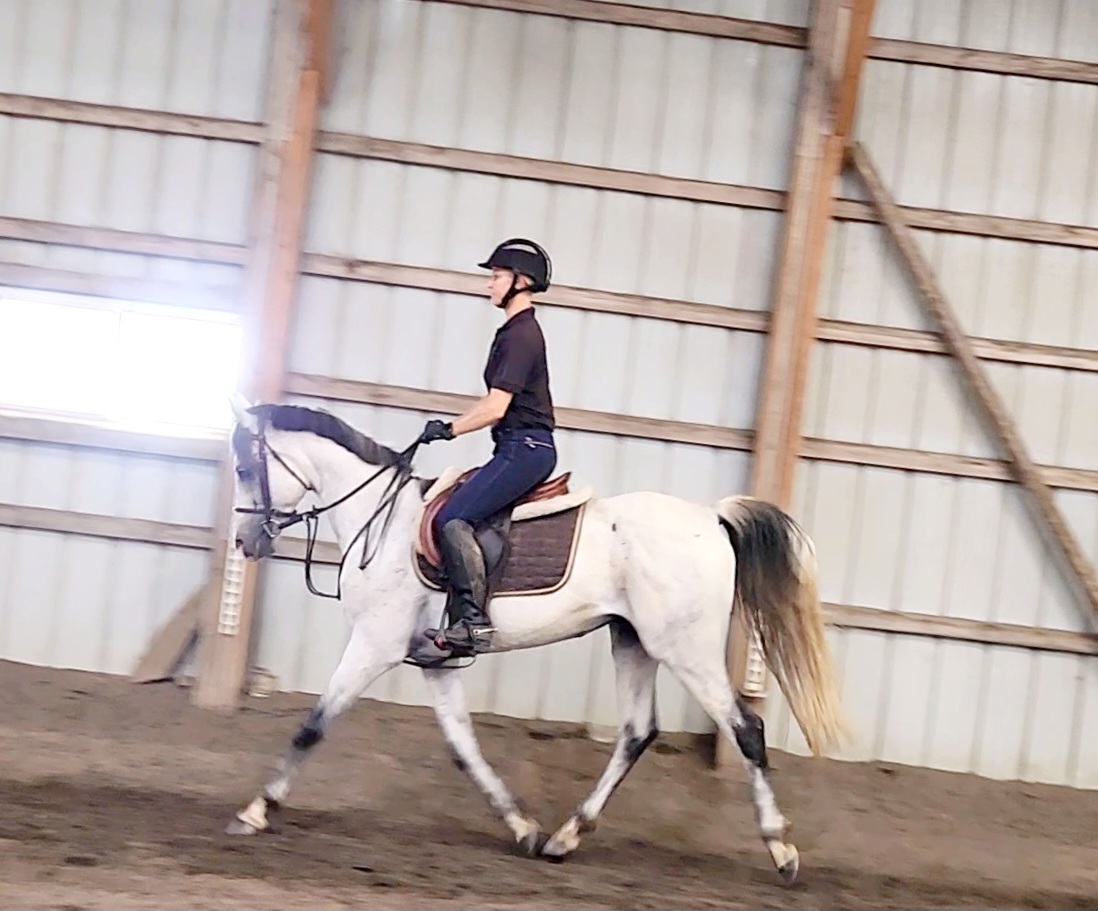So you’ve weighed up the pros and cons and made the big decision: you’re going freelance.
Great! But don’t think that it’s an instant transition — setting yourself up as a reputable, professional, and profit-making business takes some careful planning, before you leave your current job. If you put in the legwork to prepare yourself properly, you’ll be far less likely to be overwhelmed or taken by surprise when the time comes to hit the ground running.

Admittedly, I was still slightly taken by surprise when I started riding high-goal polo ponies having never watched a chukka in my life. Do as I say, not as I do. Photo by Tilly Berendt.
You may be going into freelancing cold — that is, from unemployment or from a job in a different industry — but unless you’ve amassed the necessary skills at some point in your working life, this isn’t a route I would recommend. For example: if you were a four-star eventing groom, travelled to lots of internationals, and built up an impressive resume, but have since worked in an office, you’ll probably find it fairly easy to pick up freelance grooming work, despite effectively going in cold. However, if you’ve never worked full-time as a groom you may find it harder to get references and work as a freelancer. This isn’t to say it can’t be done: you might be the best damn clipper the world has ever seen and a few photos of your work and some recommendations from friends you’ve clipped horses for could get your foot in the door enough to get further work in yards. It’s just more of a crapshoot.*
*this entire paragraph is just an excuse to use the word ‘crapshoot.’
Likewise, I initially tried to go into journalism as a freelancer, despite having never worked in the publishing industry. I got a few odd jobs writing one-off pieces but felt like I was always running into the same old brick wall of ignored emails and closed doors. I started to think I was probably just rubbish at what I was trying to do — and then I got a full-time job with a horse magazine, and suddenly, getting freelance work was no problem at all, because editors recognised, if not my own name, the publications and editors I was writing for, and took it as an indicator of not only quality, but reliability. And honestly, if there’s one thing people are looking for in freelancers, it’s reliability. And also run-on sentences. (One of those statements is a lie.)
Assuming you’re making the transition from a similar — but salaried — line of work, there are several boxes you should tick before handing in your notice and sashaying your way out of there. So without further adieu, here’s…
Your Big Fat Pre-lance (see what I did there?) To-Do List, Illustrated by America’s Best Worst Actor, Nicholas Cage, and a Bonus Beyonce
- Itemise your strengths — and your weaknesses. Pour yourself a glass of wine, because you’re going to need to be honest with yourself here. Can you sew in perfect plaits in 30 minutes, even on a fidgety horse? Fantastic — that’s a marketable quality. Are you, however, a bit nervous about getting on naughty or young horses? That’s fine — but don’t be tempted to lie and say you’ll get on anything. At best, you’ll probably dread going to work at certain yards and at worst, you’ll be caught in the lie and your reputation will suffer a big knock. Look at your skills as though you’re looking at someone else’s — would you pay someone to do something at the quality level you do it? If the answer is yes, it can go on your USP (Ultimate Selling Point) list. If not, ask yourself: is this something I can improve on with a bit of effort or by asking for guidance? Or is it something I don’t feel comfortable doing within the auspices of my job? Remember: no one can do everything. Your strengths, and your marketability, are in what YOU can do well.

Don’t try to be someone you’re not, or do something you’re not able to do, for the sake of racking up jobs.
- Be transparent in your motives. Hey, I get it: no one wants to sit down with their boss and have The Chat. But you’ll do yourself no favours if you try to sneak around and prepare for your career transition without them finding out, and actually, you could be doing yourself a huge disservice: many freelancers, and certainly freelance grooms and riders, end up booking their former employer in as their first freelance client. Even if you don’t, you should consider your professional life as a series of small islands — just one burned bridge can stop you from accessing an entire archipelago. Sit down with your employer and be candid about your long-term career plans, and ask them how you can make the eventual transition work for them, too — they’ll be grateful for your openness and may even offer some helpful advice or contacts.

Don’t feel like you have to come in like a wrecking ball, though.
- Start saving. You’re going to be so well-prepared, and so savvy at marketing yourself, that you may never need this safety net — but do it anyway. Money panic is NOT a nice feeling, and it’s a feeling that can seep into the quality of your work, so mitigate it by putting some money aside from your regular paycheque while you’ve still got it. This gives you a buffer in case you have a slow month or if you need to buy anything for your work (clippers, camera lenses, a laptop that was made this decade — this list goes on, and it can get pricey. More on this soon.)

That feeling when you’re sitting on a saucy savings account.
- Set realistic goals, but don’t be afraid to think big, too. Want to groom at a four-star? That’s a big goal, but it’s not an impossible one: you’ll want to plan to get some bigger-name riders on your client list, advertise competition grooming services, and get out and about on the competition circuit so people start to recognise you. You might not get there in your first six months, but if you start with the bigger picture and work backwards, you’ll start to see a clear route to get there. Want to write for Eventing Nation? (I mean, hello, of course you do!) Give your regional horse magazine or website a call and ask them if they’d like someone on the ground covering local competitions. I don’t care if you’re writing about seven-year-old kids jumping crossrails — you’re going to write about it like it’s going on the front page of EN. Then, you’ll have a body of work to show off your style and your ability. One of the problems that can plague freelancers is the feeling of being a bit lost in the big wide world, but having a grand plan and something tangible to work towards will not only give you a purpose, it’ll also help you to seek, find, and create positive opportunities for yourself.

Never be afraid to dream big.
- Network, network, network. I cannot possibly stress enough how important it is just to know people and to be known as a freelancer. Word-of-mouth will get you a huge amount of work, no matter what type of work you do, so put yourself in a position where you can meet people who do the same sort of work and people who hire those people. Get out to events, invite yourself to social gatherings, and be open, and friendly, and genuinely kind to everyone you meet. Not just because it can open doors, mind — because it’s the right thing to do, too.

Networking chit-chat is a fine art, but it gets easier with practice. Just moderate the amount of unblinking eye contact you use.
- Pay attention to the business climate. Try to get a feel for how in-demand your services will be in your area — and the going rate — by gauging your professional network. Chat to other freelancers in your area, and make use of regional Facebook groups to see whether more people are posting adverts seeking your skillset, or seeking work. Then, you can start to figure out the niche that your specific strengths will fit into.

Whatever those strengths may be.
- Pick up some freelance work. Yep, that’s right — you need to dive in while you’re still working full-time. The inconvenient truth of a successful freelance transition is that it doesn’t come without work — you’ll need to give up some evenings, weekends, and holiday time to test the waters and book in some work while you still have the security of a full-time job. This also gives you the chance to build your skills and experience. I used to hide Beyonce references in my articles when I was full-time at a leading UK horse magazine, and now I gratuitously shove Beyonce GIFs into almost every article I write for EN. Skill-building, people.

#noragrets
Doing the legwork before you jump ship will help you to mitigate the fear of the unknown and the lack of control that can be part and parcel of freelancing, so plan to commit to the preparation as much as you’ll commit to your career itself. Think of it as show prep: getting the horse and the tack gleaming is half the battle, and gives you the edge — and the confidence — on the day. And that, gang, is your tenuous equestrian analogy of the day.
Next time? It’s tax time, snitches. Try to contain yourselves.



















